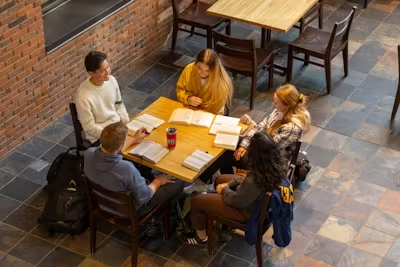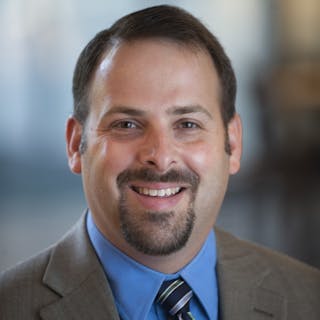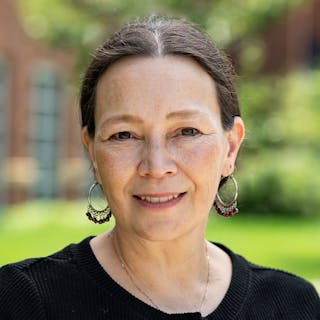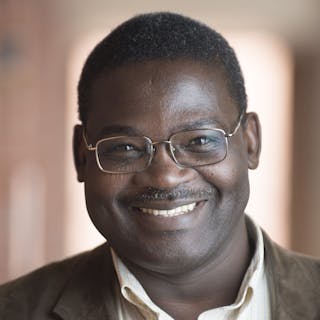


By adding a minor in pre-law, you’ll prepare for law school and for a variety of legal careers. Although law schools accept students from many majors and do not require any specific pre-law curriculum, the courses included in the pre-law minor will provide a strong foundation for future success. Pre-law is one of Bethel's pre-professional programs, which means you’ll meet with your advisor to develop a program of courses that fits your interests and prepares you for your next steps.
Contact us
Request info
Interested in learning more about Bethel's minor in pre-law? Fill out this simple form and we'll send you more information soon.
Connect with a counselor
They’ll answer your questions, connect you with professors, and help you find the right time to visit campus. They’ll be there every step of the way to help make applying to Bethel as smooth as possible.
Courses and skills
What skills will I develop?
As you explore pre-law, you’ll expand your knowledge and develop your skills as you prepare to take the Law School Admission Test (LSAT) and continue to law school and a vibrant career.

Prepare for the Law School Admission Test (LSAT)
This minor will help you prepare for the LSAT, law school, and a rewarding career. The LSAT is an essential gateway to legal education that examines your abilities in reading comprehension and logical and analytical reasoning. The pre-law minor—and all your studies—will equip you with these skills.
Core courses for your next steps
You'll take a unique set of stimulating courses in law, economics, political science, history, and philosophy that will prepare you for your next steps.
A foundation for law and beyond
Pre-law coursework will develop your capacities in research, analysis, and writing; deepen your knowledge of human behavior and institutions; and cultivate a robust philosophical and ethical reasoning that will provide an excellent foundation for law school and a meaningful career.

Academic plans
Map out your time at Bethel—from day one to your diploma. Your course schedule is designed to help you grow, gain skills, and become who you’re meant to be.
Learning opportunities
What experiences will I have?
Hands-on learning is at the core of all Bethel majors and minors. That means you’ll find numerous opportunities to get involved, apply what you’ve learned, and gain experience.

Mentorship
Bethel also has a mentorship program that connects Bethel students with alumni who have gone on to build successful careers in law. In addition, students interested in pursuing a law degree can join the Bethel Pre-Law Club, a student organization that hosts several events and law school tours each year.

Clubs and organizations
You’ll be able to participate in the Bethel Pre-Law Club, a student organization that hosts law school tours and events. You can also participate in Bethel’s Model United Nations program (BUMUN); Pi Sigma Alpha, the national political science honorary; and United Cultures of Bethel.

Research
You’ll have the chance to conduct research with professors through programs like Edgren Scholars and summer research projects. And you can conduct your own original research in local or digital archives for your senior seminar paper.
Real-world impact
How will this minor help my career goals?
Through our courses and one-on-one advising, you’ll be prepared to for law school and a successful legal career.
A strong base for law school
This minor will help prepare you for success in law school. You’ll follow in the footsteps of alumni who have gone on to earn degrees at all three law schools in the Twin Cities and several beyond Minnesota.
Transferable skills
The skills that you develop in a pre-law minor are highly transferable. You’ll be ready for a career in law, and you’ll gain knowledge that will be valuable in a variety of careers in business, nonprofit, government, and politics.
Apply your faith to your career
As you wrestle with important questions and study from a Christian perspective, you’ll be well-equipped to glorify God wherever your career takes you.

Start your journey
Explore Bethel for yourself
Visiting campus is the best way to learn about Bethel and our majors. As you try out academic and campus life at Bethel, you can attend a class, chat with students, meet professors and coaches, tour campus, and get a taste of life in our program.
Faculty mentors
Meet your professors
You’ll learn alongside faculty who are distinguished scholars and faithful Christians. They’ll know you by name and invest in your success. Professors are accessible and usually have an open-door policy so you can stop by with questions, and you’ll often find students gathered in the “HiPPos Suite.”
Department of History, Philosophy, and Political Science
Location
Contact

A path with promise
Clear price. Clear outcomes.
Know what your education costs—and where it’s taking you. You’ll start with a clear price so you can focus on what truly matters: your education and your future. And you’ll graduate with confidence through the Bethel Career Commitment, which includes built-in career coaching and additional support for eligible graduates who still need help.

Become A Bethel Student
Apply now
You belong at Bethel. If you're ready to see who you could become, start your free application today.
Find your fit
Explore related programs
This flexible minor will complement almost any major you choose. But here are a few examples:



Explore the full lists:
















